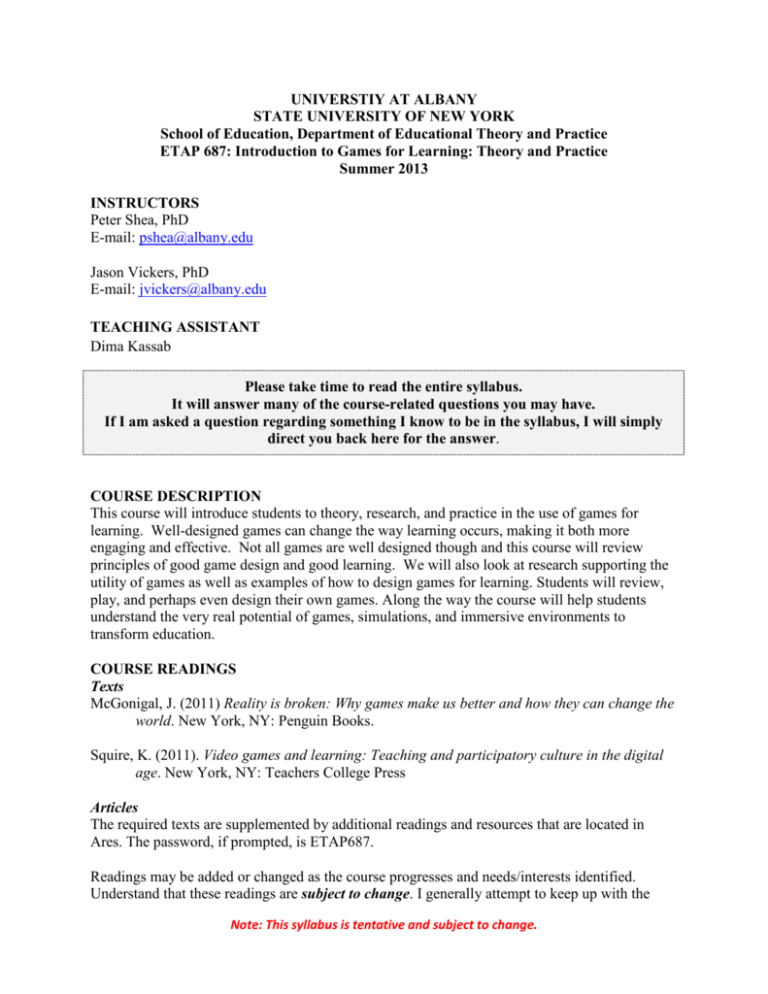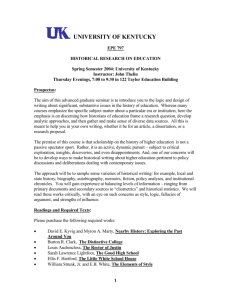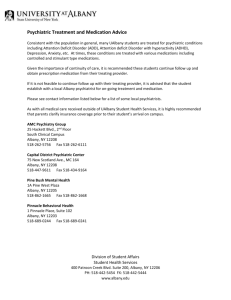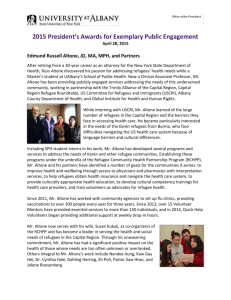Graduate Level Course Syllabus - SUNY Learning Commons
advertisement

UNIVERSTIY AT ALBANY STATE UNIVERSITY OF NEW YORK School of Education, Department of Educational Theory and Practice ETAP 687: Introduction to Games for Learning: Theory and Practice Summer 2013 INSTRUCTORS Peter Shea, PhD E-mail: pshea@albany.edu Jason Vickers, PhD E-mail: jvickers@albany.edu TEACHING ASSISTANT Dima Kassab Please take time to read the entire syllabus. It will answer many of the course-related questions you may have. If I am asked a question regarding something I know to be in the syllabus, I will simply direct you back here for the answer. COURSE DESCRIPTION This course will introduce students to theory, research, and practice in the use of games for learning. Well-designed games can change the way learning occurs, making it both more engaging and effective. Not all games are well designed though and this course will review principles of good game design and good learning. We will also look at research supporting the utility of games as well as examples of how to design games for learning. Students will review, play, and perhaps even design their own games. Along the way the course will help students understand the very real potential of games, simulations, and immersive environments to transform education. COURSE READINGS Texts McGonigal, J. (2011) Reality is broken: Why games make us better and how they can change the world. New York, NY: Penguin Books. Squire, K. (2011). Video games and learning: Teaching and participatory culture in the digital age. New York, NY: Teachers College Press Articles The required texts are supplemented by additional readings and resources that are located in Ares. The password, if prompted, is ETAP687. Readings may be added or changed as the course progresses and needs/interests identified. Understand that these readings are subject to change. I generally attempt to keep up with the Note: This syllabus is tentative and subject to change. most current research. If I see something that will support what we’re discussing and using, I will add the article to the required reading. EXPECTATIONS In order to successfully complete this course, students are expected to: 1. Actively engage in class discussions, activities, and group work 2. Share and reflect on strategies for educational technology integration and implementation 3. Read and respond to peers’ discussions in polite, critical, meaningful ways 4. Complete all class assignments, readings, and projects 5. Log into the course on a regular basis (see Participation policy). COURSE TIME & PARTICIPATION This is a graduate level 3-credit course. The University at Albany uses the Carnegie unites as the standard: for every credit hour, there should be 2-3 hours of homework. In a regular semester, this translates to about 9-12 hours of coursework per week, or 135-180 hours. Understand that the information I have just provided is for undergraduate students. Given that this is a 13 week graduate-level course, expect to spend at least 15 hours per week between readings, discussions, and assignments. Students are expected to log onto the class at least five (5) times per week. Students should read all posts by peers, participate thoughtfully in discussions, and submit assignments on time. Late assignments will be docked one full letter grade for each day they are late unless you have made arrangements with me at least 2 days prior to the due date. INCOMPLETES No incompletes will be given in this course without the express permission of both the course instructor and the student’s advisor. Students must have their advisor email the instructor that an incomplete is permissible and provide a reason I consider acceptable for the incomplete. ACADMIC INTEGRITY Whatever you produce for this course should be your own work and unique to this course. You cannot present work of others as your own. If you borrow text or media from another source or paraphrase substantial ideas from someone else, you must provide a reference to your sources. The rule of thumb on citation is that verbatim copying of four or more words from a text requires a citation. You should not submit any work for this course that you’ve also presented or will present to another course. Failure to follow these guidelines is a serious infraction of University regulations, and you will receive a zero for the work in question. Other possible penalties include a failing grade in the course, referral to the University Judicial System, or dismissal from the University. If you have any questions whether your work violates policies of academic integrity, please e-mail. You can find more detailed information regarding the Academic Integrity Policy here: http://www.albany.edu/graduatebulletin/requirements_degree.htm#standards_integrity. Note: This syllabus is tentative and subject to change. Please note that this course is not a research course. At no time will I allow research to be conducted in connection with your assignments or activities. LEARNING ACCOMMODATIONS Reasonable accommodations will be provided for students with documented physical, sensory, systemic, cognitive, learning and psychiatric disorders. If you believe you have a disability requiring accommodation in this class, please notify the Director of Disability Student Services (Campus Center 137, 442-5490). That office will provide the course instructor with verification of your disability and will recommend appropriate modifications. For more information, visit the website of the UAlbany Office for Disabled Student Services: http://www.albany.edu/disability/index.shtml . No accommodations will be provided until I have received formal notification from the UAlbany Office for Disabled Student Services of a documented disability. MY COMMUNICATION WITH YOU For general communications, I will either use the course email or announcement area. There will be occasion that I will email individuals or the whole class. I will use the email you have on file with the university. This means you will need to check your UAlbany email regularly. Blackboard 9.1 allows you to subscribe to forums, threads, and other areas in which you’re involved. When an area you’ve subscribed to is updated, you will receive an email. You may also receive updates to the announcements area via email. This is a key feature to ensure your success within the course. Although you cannot forward your UAlbany Webmail or change your preferred email account, you can configure either mail client such as Microsoft Outlook or a phone. • Directions for iPhone can be found here: https://wiki.albany.edu/display/public/askit/Configuring+an+iPhone+or+iPad+for+UAlba ny+Mail. • Directions for configuring Android phones can be found here: https://wiki.albany.edu/display/public/askit/Configuring+Android+for+UAlbany+Mail. • Last, you can configure Microsoft Outlook to pull your University mail. This information can be found here: https://wiki.albany.edu/display/public/askit/Configuring+Outlook+2010+for+UAlbany+ Mail. I encourage you to do this if you do not think you will check your UAlbany Webmail frequently. GRADING POLICY (Grade Weight) Discussions: 50% (you will self-evaluate these) Games Blog: 30% Note: This syllabus is tentative and subject to change. Reflective Journal: 10% Additional Assignments TBA: 10% This is an S/U course. All scores will be converted to percentages. In order to earn an “S” for this course, you must have at least an 83%. DISCUSSION SELF-EVALUATION You will complete three self-evaluations for discussion participation. This activity is two-fold: to allow you to reflect and evaluate your participation in discussions and to allow me to provide feedback on how your self-evaluation aligns with my assessment of your participation. These three self-evaluations will be used to arrive at your discussion grade. You will evaluate your participation in the discussions based on the following: degree of thoughtful contribution to issues, connections to the ideas of others in the course, connections to other readings, timeliness, your position in the various discussions and how the discussions changed, enlarged, or challenged your thinking. When completing the self-evaluation of your posts, you will need to use the provided discussion rubric. Specifics for discussion self-evaluation are provided in the modules 3, 5, and 6. The first self-evaluation covers Module 2 due the first week of Module 3. The second self-evaluation covers modules 3 & 4 and is due the first week of Module 5. The last self-evaluation covers Modules 5 & 6 and is due the last day of class. “ATTENDANCE” POLICY You are expected to log onto the class site at least 5 times for each 2-week module. You are expected to read all of the materials I post (the exception being when you have a choice of readings). In order to succeed, you need to “be in the class” and participate. While I can track individual student behaviors using Blackboard 9.1 (what you accessed, how long you accessed it, responses, etc.), I prefer not to do this. MY PARTICIPATION One of the largest concerns students have with instructors in online settings is that the instructor does not appear to participate in the class. This is because most of the instructor participation happens ‘behind the scenes’. This has been substantiated by research on instructional activities in online courses (Shea, Vickers, & Hayes, 2010). Findings indicate that instructors spend an average of 12% of their instructional efforts in threaded discussions. While I might not appear in discussions, I will be reading them. Also, rest assured that I will be completing other instructorrelated tasks. Feedback: On average, I will have the self-evaluation feedback returned within one week. Final project feedback: I will try to have those back as soon as I receive them. Return time is approximately 2 week for all projects. Note: This syllabus is tentative and subject to change. SUBMISSIONS When appropriate, all assignments and activities will be submitted using the “Assignment” submission feature in Blackboard 9.1. You will find the submission area in each module. Assignments such as self-evaluations must be submitted in editable, document format unless it is media other than text. Do not paste assignments into the Assignment submission section in each module. In circumstances where you create something outside Blackboard 9.1 to include with discussions, you will still need to provide me a link in the Assignment submission section. For instance, if create a Glogster, Scrapblog, or VoiceThread you will need to include the link (URL). CITATION You are required to cite all sources – even in discussions. Refer to the two links below for more information on how to cite correctly using APA citation style. University at Albany Libraries APA Style Guides http://library.albany.edu/cfox Online Writing Lab at Purdue APA Style Guide (optional but sometimes out of date) http://owl.english.purdue.edu/owl/resource/560/01/ Note: This syllabus is tentative and subject to change.





![Syllabus [Word]](http://s3.studylib.net/store/data/006967311_1-8dc868a12812e520f131dbbe02cc269a-300x300.png)


